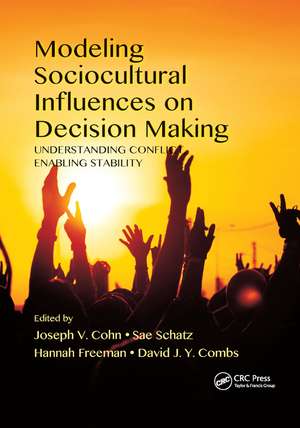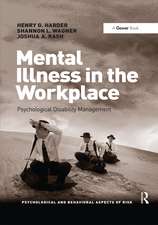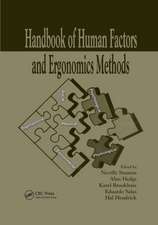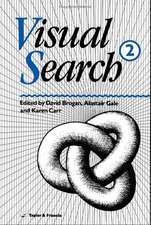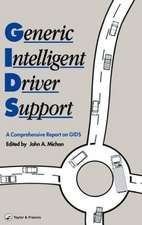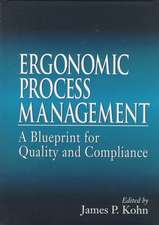Modeling Sociocultural Influences on Decision Making: Understanding Conflict, Enabling Stability: Human Factors and Ergonomics
Editat de Joseph V. Cohn, Sae Schatz, Hannah Freeman, David J. Y. Combsen Limba Engleză Paperback – 10 dec 2019
The chapters in this volume were contributed by leading experts from academia, industry, and government and provide:
- Insights into cross-cultural decision making based on recent international events, with grounding in an historical context
- Discussions of cutting-edge modeling techniques used today by professionals across multiple organizations and agencies
- Descriptions of specific cross-cultural decision making tools designed for use by laypeople and professionals
- Case studies on the role of cross-cultural decision making grounded in current events and (in many cases) military applications.
| Toate formatele și edițiile | Preț | Express |
|---|---|---|
| Paperback (1) | 492.09 lei 6-8 săpt. | |
| CRC Press – 10 dec 2019 | 492.09 lei 6-8 săpt. | |
| Hardback (1) | 888.20 lei 6-8 săpt. | |
| CRC Press – 27 sep 2016 | 888.20 lei 6-8 săpt. |
Din seria Human Factors and Ergonomics
- 8%
 Preț: 580.61 lei
Preț: 580.61 lei - 25%
 Preț: 939.36 lei
Preț: 939.36 lei - 18%
 Preț: 701.56 lei
Preț: 701.56 lei - 32%
 Preț: 1224.67 lei
Preț: 1224.67 lei - 18%
 Preț: 820.33 lei
Preț: 820.33 lei - 15%
 Preț: 613.49 lei
Preț: 613.49 lei - 20%
 Preț: 466.24 lei
Preț: 466.24 lei - 22%
 Preț: 355.07 lei
Preț: 355.07 lei - 15%
 Preț: 461.87 lei
Preț: 461.87 lei - 15%
 Preț: 606.55 lei
Preț: 606.55 lei - 15%
 Preț: 567.08 lei
Preț: 567.08 lei - 28%
 Preț: 439.80 lei
Preț: 439.80 lei - 23%
 Preț: 427.84 lei
Preț: 427.84 lei - 27%
 Preț: 436.29 lei
Preț: 436.29 lei - 22%
 Preț: 333.29 lei
Preț: 333.29 lei -
 Preț: 504.99 lei
Preț: 504.99 lei - 22%
 Preț: 402.77 lei
Preț: 402.77 lei - 11%
 Preț: 320.94 lei
Preț: 320.94 lei - 18%
 Preț: 788.77 lei
Preț: 788.77 lei - 18%
 Preț: 787.97 lei
Preț: 787.97 lei - 18%
 Preț: 1141.42 lei
Preț: 1141.42 lei - 18%
 Preț: 1814.36 lei
Preț: 1814.36 lei - 18%
 Preț: 1336.94 lei
Preț: 1336.94 lei - 18%
 Preț: 808.50 lei
Preț: 808.50 lei - 11%
 Preț: 320.72 lei
Preț: 320.72 lei - 10%
 Preț: 324.91 lei
Preț: 324.91 lei - 20%
 Preț: 737.66 lei
Preț: 737.66 lei - 28%
 Preț: 1430.95 lei
Preț: 1430.95 lei - 28%
 Preț: 907.87 lei
Preț: 907.87 lei - 29%
 Preț: 2000.24 lei
Preț: 2000.24 lei - 28%
 Preț: 497.12 lei
Preț: 497.12 lei - 26%
 Preț: 1261.79 lei
Preț: 1261.79 lei - 19%
 Preț: 461.48 lei
Preț: 461.48 lei
Preț: 492.09 lei
Nou
Puncte Express: 738
Preț estimativ în valută:
94.19€ • 102.35$ • 79.17£
94.19€ • 102.35$ • 79.17£
Carte tipărită la comandă
Livrare economică 21 aprilie-05 mai
Preluare comenzi: 021 569.72.76
Specificații
ISBN-13: 9780367874070
ISBN-10: 0367874075
Pagini: 576
Dimensiuni: 178 x 254 x 30 mm
Greutate: 0.99 kg
Ediția:1
Editura: CRC Press
Colecția CRC Press
Seria Human Factors and Ergonomics
ISBN-10: 0367874075
Pagini: 576
Dimensiuni: 178 x 254 x 30 mm
Greutate: 0.99 kg
Ediția:1
Editura: CRC Press
Colecția CRC Press
Seria Human Factors and Ergonomics
Cuprins
Introduction; Section I Building Theories; Expeditionary Modeling for Megacities and Other Dense Urban Areas; More than Just a Story: Narrative Insights into Comprehension, Ideology, and Decision Making; The Spread of Information via Social Media; The Spread of Opinions in Societies; Culture’s Influences on Cognitive Reflection; Cultural Influences on Cognitive Biases in Judgment and Decision Making: On the Need for New Theory and Models for Accidents and Safety; Section II Collecting and Analyzing Data; The Sixty Percent Mission: An Introduction to High-Risk Ethnography Process and Protocol in Support of the US Army’s Civil Affairs Humanitarian Mission; Challenges in Connecting with the Disconnected: An Introduction to Connecting with Communities Disconnected from the Rest of the World; They Are Beyond WEIRD: Helpful Frameworks for Conducting Non-WEIRD Research; Deciphering the Emic Perspective in Data in Order to Assess Threat; Collecting Data and Semantic Content via Mobile Devices; Measuring Changes in Attitudes: Using Factor Analysis to Track Population Attitudes Spatially and Temporally; Gaining Insight by Applying Geographical Modeling; Section III Building and Validating Sociocultural Models; Sociocultural Capability Requirements across All Phases of Military Operations; Methods to Characterize and Manage Uncertainty for Sociocultural Applications; Validating Causal and Predictive Claims in Sociocultural Models; Rapid Generation of Political Conflict Simulations for Scenarios around the World; Detailed Model Development Case Study: The Peace Game; Section IV Applying Sociocultural Models to Gain Insight into Conflict and Instability; Using the Social Framework Model of Trust to Better Understand Trust in Government; Understanding Public Opinion toward Violent Extremists; Modeling Sociocultural Influences on Decision Making: Assessing Conf
Notă biografică
Joseph V. Cohn, PhD, earned his BS in biology from the University of Illinois–Urbana
Champaign in 1993. He earned his PhD in neuroscience from Brandeis University in 1998.
He has coauthored more than 100 publications and presented talks to national and international
professional conferences on a host of topics, ranging from foundational neuroscience
to the nature of technical innovation. He has coedited a three-volume book series
focusing on all aspects of training system development and a single-volume book on
enhancing human performance in high-risk environments. He has received industry and
professional society awards for his research across the spectrum of the human performance
and biomedical sciences. He cochaired the Applied Human Factors and Ergonomics
Association’s Cross-Cultural Decision Making Conference from 2013 to 2015 and is a fellow
of the American Psychological Association and the Society of Military Psychologists,
as well as an associate fellow of the Aerospace Medical Association.
Sae Schatz, PhD, is an applied human-systems researcher, learning science professional,
and cognitive scientist. She has headed an array of applied research efforts, authored more
than 50 peer-reviewed scholarly publications, led the development of three military textbooks,
and received industry awards for both her publications and her research efforts.
Schatz cochairs the Applied Human Factors and Ergonomics Association’s Cross-Cultural
Decision Making Conference (2013–), is a service principal for the Interservice/Industry
Training, Simulation and Education Conference (2015–), and supports international science
and technology working groups associated with the North Atlantic Treaty Organization,
Partnership for Peace, and The Technical Cooperation Program. Schatz also maintains
close ties
Champaign in 1993. He earned his PhD in neuroscience from Brandeis University in 1998.
He has coauthored more than 100 publications and presented talks to national and international
professional conferences on a host of topics, ranging from foundational neuroscience
to the nature of technical innovation. He has coedited a three-volume book series
focusing on all aspects of training system development and a single-volume book on
enhancing human performance in high-risk environments. He has received industry and
professional society awards for his research across the spectrum of the human performance
and biomedical sciences. He cochaired the Applied Human Factors and Ergonomics
Association’s Cross-Cultural Decision Making Conference from 2013 to 2015 and is a fellow
of the American Psychological Association and the Society of Military Psychologists,
as well as an associate fellow of the Aerospace Medical Association.
Sae Schatz, PhD, is an applied human-systems researcher, learning science professional,
and cognitive scientist. She has headed an array of applied research efforts, authored more
than 50 peer-reviewed scholarly publications, led the development of three military textbooks,
and received industry awards for both her publications and her research efforts.
Schatz cochairs the Applied Human Factors and Ergonomics Association’s Cross-Cultural
Decision Making Conference (2013–), is a service principal for the Interservice/Industry
Training, Simulation and Education Conference (2015–), and supports international science
and technology working groups associated with the North Atlantic Treaty Organization,
Partnership for Peace, and The Technical Cooperation Program. Schatz also maintains
close ties
Recenzii
"The structure of the book is excellent and gives a framework for organizing ideas in this complex area. Hopefully books like this will by a catalyst for more work in the area and a further maturation of the models and what we can use them for."
— Rudolph Darken, Naval Postgraduate School, USA
"I think this book will impact current and future work in the areas that form the intersection of applied social science, computer science, and sociocultural methods. It provides an integrated stance on very complex social and computational issues while retaining a sense for practical application. The book offers a nice blend of theoretical, methodological, and application-focused chapters that will aid a reader in learning about sociocultural topics and applying cutting-edge methods to the real-world issues. The editors have successfully compiled a diverse set of experts to explore very challenging issues that have very real implications for the military, and more broadly, the global business and social domains."
— Joseph B. Lyons, Air Force Research Laboratory, USA
— Rudolph Darken, Naval Postgraduate School, USA
"I think this book will impact current and future work in the areas that form the intersection of applied social science, computer science, and sociocultural methods. It provides an integrated stance on very complex social and computational issues while retaining a sense for practical application. The book offers a nice blend of theoretical, methodological, and application-focused chapters that will aid a reader in learning about sociocultural topics and applying cutting-edge methods to the real-world issues. The editors have successfully compiled a diverse set of experts to explore very challenging issues that have very real implications for the military, and more broadly, the global business and social domains."
— Joseph B. Lyons, Air Force Research Laboratory, USA
Descriere
Cross Cultural Decision Making seeks to understand the impact that a variety of influences including geographical, historical, sociological, organizational, team, and technology have on an individual's decision making processes. This book proposes to explore how advances in information and social media technologies, as well as modeling and simul
